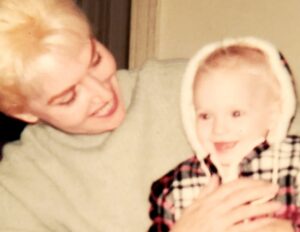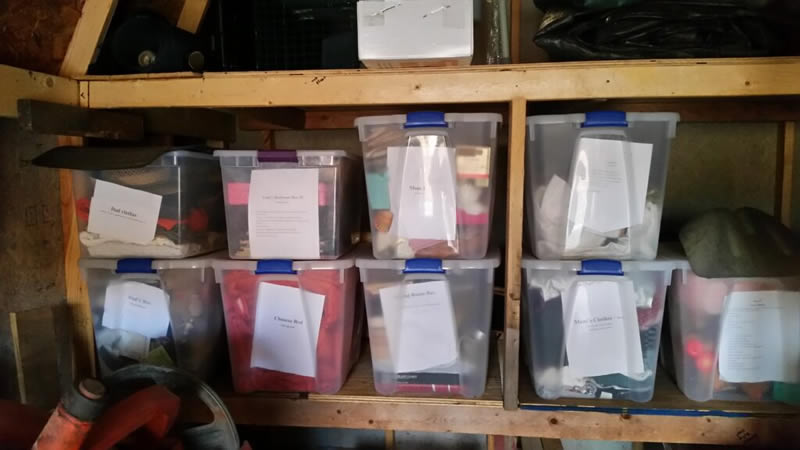We know grief usually evolves, becoming less intense and feeling more survivable years after the death of a parent. But how does that happen? Can we do or not do certain things to slow down or speed up our journey? Well, in a way, yes.
In this article, I want to share what changed my grief – what carried me to the other side of tremendous pain. Maybe you will see some of these behaviors in yourself. Or maybe you will want to add a few and try them out. But remember, grief is still a journey with its own clock.
You cannot force grief to evolve, but you can create a healthy atmosphere in which it will change based on your own individual circumstances, personality and relationship with the deceased. So, that being said, here’s my story:
I howled as I stood beside my mother’s bed in 2009. After taking her pulse, I realized she was dead. I buried my face in my husband’s chest. I cried out again when the hospice nurse arrived, put a stethoscope on her chest and shook her head “no.”

Mom’s house became my mourning place as I cleaned out my parents’ home over an 8-year period. Not that I didn’t mourn her elsewhere. But the house was an operation room of sorts. It’s where I exposed all my insides to the full force of grief’s scalpel.
I sold their house in 2018. Despite all the years that had passed, I hated letting go of the place where I had felt their presence most. However, I definitely saw a change in me. My grief was not the same. How did that happen? Was it simply passage of time? I can confidently say no.

How long will grief last? When will the pain subside? I see social media posts from people who say the grief still feels fresh years later. They fear that sorrow will never subside. While each of us will follow a unique timeline with our grief, I sometimes wonder what might be happening inside the hurting that keeps a sense of healing out of reach. I want to connect, offer a hug, and help.
As I reflected on my grief a decade after Mom’s death, I saw not only a different sort of sorrow, but I identified things I did and things that occurred to help me experience a measure of healing. I’ve identified eight to share with you below.
- I put my hands on grief. I didn’t run away from grief, ignore it or deny it access. I knew I could not get around, over or under grief. I had to go through it. I allowed myself to meticulously experience each feeling, thought and memory – from regret over not being with Mom when she died to discarding Equal sweetener packets, kept at my home under the illusion she’d someday return to use them.
- I “spoke” of my grief. I let my husband and supportive friends know what was going on in my head and heart. I journaled my grief experiences, a written, private way of getting the grief “out.” Later, I accepted engagements to speak to groups.
- I seized something new. My mother died 16 weeks after my wedding. Being a new wife gave me something positive, challenging and joyful to do. While I would advise we wait to launch into something drastic the year after a major loss, finding something positive to put our thoughts into without also denying our sorrowful side can be helpful. Maybe a new hobby, class, or house project.
- I rested from grief. I seesawed between diving into grief and pursuing the joys of being a new wife. I learned later what I was following the Dual Process Model. The model champions the idea that the healing process is a mixture of acceptance and confrontation.
- I prayed. And prayed. And prayed. I’m talking about holding conversations with God and listening for his reply and guidance. Of cuddling up to his friendship. Of discovering his love, comfort and peace. Grief is a doorway to God. It is up to us whether we will walk through it. Sometimes, we get mad at God. That’s okay. I yelled at him, but I didn’t stop speaking to him. He alone had the answers and perspective I needed.
- I found connection to my parents. As I walked through the first 10 years without Mom, I realized we all seek connection with our beloveds, though not necessarily in the same way. I often found connection through my parents’ possessions. We may safeguard keepsakes of our loved ones or use and wear items of theirs. We may support causes they supported. We may cook dishes they loved or visit places they’d lived. For me, the best connection is knowing they are with the God I serve. Their bodies died. Their souls survive.

- I sought to help others in their grief. Helping others gave the loss of my parents – and my struggle to find that “new normal” – meaning and purpose. I was blessed with new perspectives during the critical first years of grief. What a blessing it was to “give back.” And I learned from others’ experiences. Each time I felt a little more healing.
- I allowed myself to return to grief’s classroom. I remember five years after Mom died, I relapsed into the “shock stage” for a few moments. At other times, I crumbled into a heap of distress and tears. Really? I said to myself. It’s been five years and you are no further along? I wanted to run away from new, intense feelings, but I knew no matter what the calendar reported, my journey was going to last a long, long time.
We will experience a sense of healing, but we will not be totally healed this side of heaven. And that is okay. Grief isn’t a checklist to complete that allows the declaration “I’m healed!”
We don’t only mourn a loss of yesterday but of the right now. And the right now of next year when a new baby arrives. And the right now of when a relative died who was a sort of stand in for a parent. And the right now of when we face age and illness as a mother and father did.
They still aren’t here to share whatever is going on in our lives right now, and thus, we mourn, but we don’t have to mourn like we did Year Number One. Or Year Number Five.
I hope these stories about what helped me journey through the intensity of grief will help you incorporate the reality of loss into the beauty of life ahead.
What coping mechanisms and healing measures would you add to the list above? Please leave a comment because I’d love to learn what worked for you.
Copyright © 2019 by Toni Lepeska. All rights reserved. www.tonilepeska.com
Updated 2022






 Reading Inherited Diaries
Reading Inherited Diaries
Beautiful thank you for sharing. I lost my mom and im also finding going through her things is helpful. Sometimes i feel like im loving her life and not mine. Absorbing her sadness and unfulfilled dreams and i get scared that i will also be sick like my mom became. I dont have a family or partner. Im 45 and this is lonely and scary with nothing to fall back on. Its only been 2 and a half months. It feels like forever and 5 mins ago. Its sheer terror and total devastation. My mom was my person. My soulmate. Im just trying to stay afloat and this article was hopeful.
Jaz, I’m so sorry about your mom. I can hear your grief and a son’s love in your words. I considered going thru my folk’s house a blessing and a way to honor them by doing that duty – but yes, terribly difficult because all my regrets and loneliness and pain would pour out. At 3 months and even 18 mons, things felt so fresh as it does for you. Keep handling your grief – it will becone less intense and you will find a way back into YOUR life. At the same time, you will carry a big part of your mom with you. She won’t be lost. I will say a prayer for you. Keep in touch and also find other supportive people near you or on social media. I’m pulling for you! Let me know how things progress – be kind and patient with yourself! 🙂
Thank you for writing this.
I lost my my mum to cancer 3 months ago. I miss her so much.
Just yesterday I was talking to my husband, asking how do I stop hurting?
He suggested finding positives in what has happened i.e it has brought my family closer, we have had some special prayer times together. It has changed my relationship with my dad, for the better. It is hard to be positive, even though I know she is with Jesus and she is not suffering anymore.
I hope when I look back in 10 years I will see more things to be grateful for. I know I won’t stop missing her, I just what to feel happy again x
Hi, Lucy. I’m sorry about your mum. There is nothing like a mother, so it is a great loss to us. I’m glad you have a supportive husband. 3 months is like it happened yesterday. It is good to look at the positives and at the same time not to shove our pain away as tho it did not happen. The only way past our grief is thru it. We can become tired of slogging thru all this emotion, but believe me you will get there. God, in facr, is never closer than when we are brokenhearted. Hugs for you.